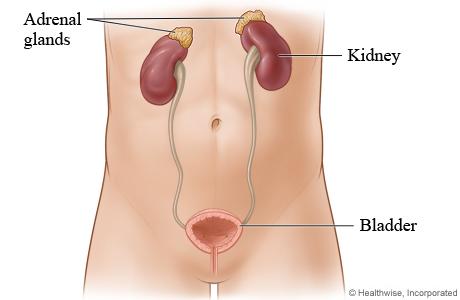Adrenalectomy is surgery to remove all or part of one or both adrenal glands. The glands are above the kidneys. They make hormones that affect nearly every organ in the body. These hormones include adrenaline and cortisol. They do many things in the body. For example, they help control blood pressure. They help the body deal with stress. And they control the breakdown of fats and proteins in the liver.
Surgery on the adrenal gland is done to remove a tumor or abnormal growth. Most tumors of the adrenal glands are benign, meaning they are not cancers that will spread to another part of the body. These tumors might secret too much hormone such as Cortisol (known as Cushing’s syndrome), too much adrenaline (known as pheochromocytoma), or too much aldosterone (known as aldosteronoma). In rare cases these tumors be cancers. If there is any concern about the possibility of cancer then the tumor should also be removed, even if it is not producing too much hormone.
The majority of adrenal surgery is done by laparoscopic surgery. To do this, the doctor puts a lighted tube, or scope, and other tools through three or four small cuts. In rare cases, the surgery needs to be done through a single, larger incision. This is known as open surgery.
If you have laparoscopic surgery, you may be able to leave the hospital the next day. With open surgery, you may stay in the hospital for a few days or longer.
What happens before an adrenalectomy?
Surgery can be stressful. This information will help you understand what you can expect. And it will help you safely prepare for surgery.
Preparing for surgery
Understand exactly what surgery is planned, along with the risks, benefits, and other options.
Tell your doctors ALL the medicines, vitamins, supplements, and herbal remedies you take. Some of these can increase the risk of bleeding or interact with anesthesia.
If you take aspirin or some other blood thinner, be sure to talk to your doctor. He or she will tell you if you should stop taking it before your surgery. Make sure that you understand exactly what your doctor wants you to do.
Your doctor will tell you which medicines to take or stop before your surgery. You may need to stop taking certain medicines a week or more before surgery. So talk to your doctor as soon as you can.
Adrenalectomy: Your recovery
The area will feel sore after the surgery. This usually lasts about 1 to 2 weeks. Your doctor will give you pain medicine.
Your body can work fine with one healthy adrenal gland. If both adrenal glands were removed or your remaining adrenal gland isn’t healthy, you can take medicine every day to replace the hormones they were making.
© 2016-2019 Healthwise, Incorporated.








 Credit
Credit
